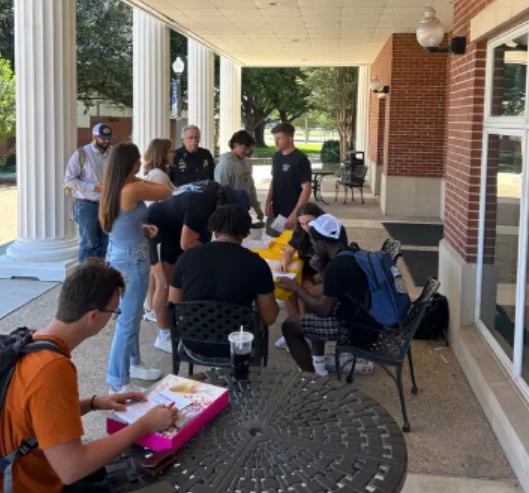
Story by Katelyn Sims
From September 23rd through the 26th, Guy D. Newman Honors students at Howard Payne University (HPU) conducted a voter registration drive on campus for an experience credit in their class. With a finalized list of 200 students registered to vote, they sought to inspire their peers to take part in something big and dismantle the stigma of youth civic engagement.
Dr. Dave Claborn, professor of government at HPU, teaches a class titled “American Political Culture” that is part of the required course load for students within the Guy D. Newman Honors Academy. This class focuses on facets of politics beyond formal institutions namely, the office of President, Congress and the Courts. Instead, students delve into a study of politics through analyzing the media, public opinion, interest groups, and elections.
Claborn pitched the idea for students to conduct a voter registration drive on campus for an experience credit. After helping 200 of their peers to register, he was left amazed at the student’s tenacity.
“I’m so proud of students who could’ve stayed safe, gone through the motions of a usual class experience and still made their usual A,” said Claborn. “But those who chose to let their imaginations take the problem and turn it over until it was resolved, they give me hope about our future.”
The usual tally for this activity over the years has collected around 20 registrations, making this year’s tally astounding. Furthermore, 200 registrations highlights around a quarter of the full-time students at HPU.
Junior Adrielle Sloan and Senior Sadie Willie, honors students at HPU and both Sumners Scholars with the Sumners Foundation, took it upon themselves to lead their peers in the endeavor.
“As an HPU student enrolled in Dr. Claborn’s class, I was inspired when our class was presented with this compelling opportunity,” said Sloan. “This challenge prompted us to recognize the academic implications and the critical importance of fostering civic engagement among our peers.”
From strategizing how to compel students to participate, to coordinating with HPU faculty, these students went above and beyond to advocate for voting accessibility for college students.
“My experience at the registration table was very positive,” said Rachel Baergan, a senior middle school English education major at HPU. “As a college student, accessible voting registration is important because many college students are new to the area and may have no idea where to go to register.”
“As this is my first presidential election with the ability to vote as a college student, registering at the table was super easy and straightforward,” said Jack Shackelford, a senior finance major at HPU. “It’s important for voting registration to be accessible because voting is crucial for the future of our nation – it empowers us to shape the future we want to see, especially one built to glorify Jesus.”
In addition to Claborn, the students coordinated their efforts under the guidance of Professor Kenan Boland, assistant professor of government at HPU.
“At the beginning of the semester, Dr. Claborn and I discussed how much we want to make sure that HPU students have an opportunity to register,” said Boland. “After talking with him, Dr. Matthew McNiece and others, we decided that this would be a good project for our Honors Academy students; and an ideal way to conduct real-world application of class principles.”
Both Boland and Claborn commented on their passion behind prompting students to engage in their constitutional privileges.
“As a professor of government, it is important to teach content, but it is equally important to encourage students to take their civil duties seriously,” said Boland. “During a time when it seems like there is so much division and animosity, we need to remember what a gift democracy is and make sure we are engaged in the system – these student leaders are passing that torch to a new generation, and that makes me hopeful.”
“Our constitutional government needs each younger generation to work within the procedures we have to help steer our nation in directions differently than we would’ve gone without them there,” said Claborn. “It’s the way we will then obtain legitimate policies, institutions, and officials in the United States.”
On a D-3 college campus in the middle of west Texas, these college students believed themselves capable of sparking influence – uprooting cultural stereotypes about their generation’s lack of zeal towards the preservation of democracy. Imagine what other college students are capable of inspiring at other universities across the nation.